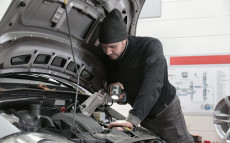- pathfindersAI
- Job Profile
Insurance Appraisers, Auto Damage
Summary
Insurance Appraisers, Auto Damage: A Detailed Job Description
What They Do
Insurance appraisers specializing in auto damage play a pivotal role in the insurance industry, serving as the linchpin between insurance companies and claimants involved in automobile accidents or vehicle damage cases. Their primary duty is to evaluate the extent of damage to vehicles involved in an incident, determine the value of losses, and ascertain the cost of repairs. This involves meticulous inspection of damaged vehicles, using specialized tools and software to assess the damage, and preparing comprehensive reports that aide insurance companies in processing claims efficiently and fairly.
Job Responsibilities
Insurance appraisers in the field of auto damage are tasked with a multitude of responsibilities. Firstly, they conduct thorough on-site inspections of damaged vehicles to assess the collision impact and other forms of damage. They are required to take detailed notes, capture photographs, and document findings with precision. Utilizing specialized software, such as auto estimating systems, they calculate repair costs and decide whether the vehicle is repairable or a total loss. Additionally, they must communicate effectively with vehicle owners, repair shops, and insurance adjusters to gather all necessary information and ensure a smooth claims process. Proper documentation and adherence to regulations and company guidelines are also imperative aspects of their responsibilities.
Essential Skills
Proficiency in certain skills is crucial for success in the role of an auto damage insurance appraiser. Analytical skills are indispensable, as appraisers must accurately assess and evaluate the extent of vehicle damage and its repair costs. Strong communication skills are also essential, given the need to converse with vehicle owners, repair mechanics, and insurance adjusters clearly and effectively. Attention to detail is paramount, ensuring accurate documentation of findings and avoidance of errors that could affect claim outcomes. Furthermore, technical aptitude is key, as the use of digital tools and software is common in estimating repair costs and documenting inspections. A deep understanding of automobile mechanics and industry standards further enhances their ability to perform their role effectively.
Educational Pathways
The educational journey towards becoming an auto damage insurance appraiser typically begins with a high school diploma or equivalent. Although not always mandatory, post-secondary education in fields such as automotive repair, engineering, or insurance can prove advantageous. Technical schools, community colleges, and vocational training institutes offer programs specializing in auto repair, which provide a robust foundation in the mechanics of vehicles. Gaining certification from recognized bodies, such as the Inter-Industry Conference on Auto Collision Repair (I-CAR), can significantly bolster one’s knowledge and credibility in the industry. Many aspiring appraisers also benefit from on-the-job training and apprenticeships, which provide practical experience and mentorship under seasoned professionals in the field.
Career Prospects
The career prospects for auto damage insurance appraisers are promising, supported by a steady demand for their expertise within the insurance industry. The Bureau of Labor Statistics projects continued job opportunities in this domain, as the need for accurate damage assessment and cost estimation remains constant. Appraisers can find employment with insurance companies, independent adjusting firms, and automotive repair shops. With experience, there are opportunities for career advancement into senior appraisal positions, supervisory roles, or specialized areas such as classic car appraisals or catastrophe assessments. The blend of technical expertise, industry knowledge, and practical experience positions auto damage insurance appraisers for a stable and rewarding career.
Conclusion
In conclusion, the role of an insurance appraiser in auto damage is multifaceted, requiring a blend of analytical abilities, technical knowledge, and adept communication skills. By following a dedicated educational pathway and honing essential skills, individuals can embark on a career that is both challenging and rewarding. The ever-present need for accurate and fair vehicle damage assessment ensures robust career prospects within the insurance industry. For those with a keen interest in automobiles and a meticulous eye for detail, becoming an auto damage insurance appraiser offers a fulfilling and dynamic professional journey.
Video
Compensation
| State | Median Salary | Median Hourly | Positions |
|---|---|---|---|
| AZ | 71,090 | 34.18 | 180 |
| AR | 66,000 | 31.73 | 80 |
| CA | 80,830 | 38.86 | 610 |
| CO | 64,480 | 31.00 | 510 |
| FL | 74,450 | 35.79 | 720 |
| GA | 73,910 | 35.53 | 490 |
| HI | 89,820 | 43.18 | 40 |
| IL | 60,010 | 28.85 | 100 |
| IA | 75,240 | 36.17 | 70 |
| KY | 74,810 | 35.97 | 120 |
| LA | 65,180 | 31.34 | 250 |
| MD | 98,260 | 47.24 | 110 |
| MA | 83,300 | 40.05 | 260 |
| MI | 69,220 | 33.28 | 270 |
| MS | 66,040 | 31.75 | 50 |
| NV | 75,850 | 36.47 | 160 |
| NJ | 81,200 | 39.04 | 530 |
| NM | 74,070 | 35.61 | 60 |
| NC | 73,830 | 35.50 | 500 |
| OH | 87,420 | 42.03 | 240 |
| OK | 78,790 | 37.88 | 80 |
| RI | 80,510 | 38.71 | 50 |
| SC | 73,660 | 35.42 | 30 |
| SD | 67,950 | 32.67 | 50 |
| TX | 63,720 | 30.64 | 1,040 |
| UT | 72,210 | 34.71 | 100 |
| VA | 80,160 | 38.54 | 230 |
| WA | 70,960 | 34.11 | 100 |
Similar Occupations
In this area you will find other occupations that are close to the one you were viewing in tasks, knowledge and work environment. If the primary job profile you are viewing isn't quite to your liking, take a look around and see what else is available.
Basic and Premium Accounts have more alternative occupations available than the Free account.

Automotive Body and Related Repairers - 49-3021.00
Automotive Body and Related Repairers restore the structural integrity and appearance of vehicles by repairing, replacing, and refinishing damaged car frames and body panels. They use specialized tools and techniques to bring vehicles back to their pre-accident condition, ensuring both functionality and visual appeal.
-
$48,740/yr
Median Pay -
151,910
Number of Jobs

Automotive Service Technicians and Mechanics - 49-3023.00
Automotive Service Technicians and Mechanics diagnose, maintain, and repair vehicles by inspecting and working on various components such as engines, brakes, transmissions, and electronics. They ensure automobiles are safe and efficient by conducting routine maintenance, performing complex repairs, and using specialized tools and diagnostic equipment.
-
$47,770/yr
Median Pay -
676,570
Number of Jobs